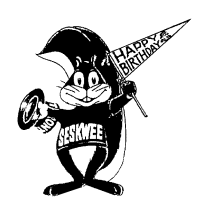Trader Joe’s vs. Irate Joe’s
By Richard Stobbe
In a long-running battle between Trader Joe’s and _Irate Joe’s (formerly Pirate Joe’s, a purveyor of genuine Trader Joe’s products in Vancouver, B.C.), the US Circuit Court of Appeals recently weighed in. We originally covered this story a few years ago.
In Trader Joe’s Company v. Hallatt, an individual, dba Pirate Joe’s, aka Transilvania Trading [PDF], the court considered the extraterritorial reach of US trademarks laws. The Defendant, Michael Hallatt, didn’t deny that he purchased Trader Joe’s-branded groceries in Washington state, smuggled this contraband across the border, and then resold it in a store called “Pirate Joe’s” (although Hallatt later dropped the “P” to express his frustration with TJ’s). Trader Joe’s sued in U.S. federal court for trademark infringement and unfair competition under both the federal Lanham Act and Washington state law. Since Mr. Hallatt’s allegedly infringing activity took place entirely in Canada, the question was whether U.S. federal trademarks law would extend to provide a remedy in a U.S. Court.
In the wake of this decision, Trader Joe’s federal claims are kept alive, although the court dismissed the state law claims against Hallatt.
The court concluded: “We resolve two questions to decide whether the Lanham Act reaches Hallatt’s allegedly infringing conduct, much of which occurred in Canada: First, is the extraterritorial application of the Lanham Act an issue that implicates federal courts’ subject-matter jurisdiction? Second, did Trader Joe’s allege that Hallatt’s conduct impacted American commerce in a manner sufficient to invoke the Lanham Act’s protections? Because we answer “no†to the first question but “yes†to the second, we reverse the district court’s dismissal of the federal claims and remand for further proceedings.”
In plain English, the appeals court has asked the lower court to reconsider the federal claims and make a final decision. Grab a bag of Trader Joe’s Pita Crisps with Cranberries & Pumpkin Seeds … and stay tuned!

Calgary – 08:00 MST
No comments
Licensees Beware: assignment provisions in a license agreement
By Richard Stobbe
Let’s say a company negotiates a patent license agreement with the patent owner. The agreement includes a clear prohibition against assignment – in other words, for either party to transfer their rights under the agreement, they have to get the consent of the other party. Â So what happens if the underlying patent is transferred by the patent owner?
The clause in a recent case was very clear:
Neither party hereto shall assign, subcontract, sublicense or otherwise transfer this Agreement or any interest hereunder, or assign or delegate any of its rights or obligations hereunder, without the prior written consent of the other party. Any such attempted assignment, subcontract, sublicense or transfer thereof shall be void and have no force or effect. This Agreement shall be binding upon, and shall inure to the benefit of the parties hereto and their respective successors and heirs. [Emphasis added]
That was the clause appearing in a license agreement for a patented waterproof zipper between YKK Corp. and Au Haven LLC, the patent owner.  YKK negotiated an exclusive license to manufacture the patented zippers in exchange for a royalty on sales. Through a series of assignments, ownership of the patent was transferred to a new owner, Trelleborg. YKK, however, did not consent to the assignment of the patent to Trelleborg. The new owner later joined Au Haven and they both sued YKK for breach of the patent license agreement as well as infringement of the licensed patent.
YKK countered, arguing that Trelleborg (the patent owner) did not have standing to sue, since the purported assignment was void, according to the clause quoted above, due to the fact that YKK’s consent was never obtained: “Any such attempted assignment, subcontract, sublicense or transfer thereof shall be void and have no force or effect.” (Emphasis added) In other words, Â YKK argued that since the attempted assignment of the patent was done without consent, it was not an effective assignment, and thus Trelleborg was not the proper owner of the patent, and thus had no right to sue for infringement of that patent.
The court considered this in the recent US decision in Au New Haven LLC v. YKK Corporation (US District Court SDNY, Sept. 28, 2016) (hat tip to Finnegan). Rejecting YKK’s argument, the court found that the clause did not prevent assignments of the underlying patent or render assignments of the patent invalid, since the clause only prohibited assignments of the agreement and of any interest under the agreement, and it did not specifically mention the assignment of the patent itself.
Thus, the transfer of the patent (even though it was done without YKK’s consent) was valid, meaning Trelleborg had the right to sue for infringement of that patent.
Both licensors and licensees should take care to consider the consequences of the assignment provisions of their license, whether assignment is permitted by the licensee or licensor, and whether assignment of the underlying patent should be controlled under the agreement.
Calgary – 07:00 MST
No commentsOnline Defamation & Libel: The Trump Effect
By Richard Stobbe
It’s not often that our little blog intersects with such titanic struggles as the U.S. presidential race – and by using the term “titanic” IÂ certainly don’t mean to suggest that anything disastrous is in the future.
After the New York Times published personal allegations of sexual assault against presidential candidate Donald Trump, the candidate’s lawyers promptly fired a shot across the bow, threatening legal action for libel and demanding that the article be removed from the Times’s website. Last week, the lawyer for the New York Times responded to lawyers for Mr.  Trump with a succinct defense of their publication of the article, arguing “We did what the law allows: We published newsworthy information about a subject of deep public concern.”
If this had happened in Canada, the law would almost certainly favour the position taken by the Times. In Quan v. Cusson, [2009] 3 SCR 712, the Supreme Court of Canada confirmed the defense of “responsible communication on matters of public interest” permitting journalists to report on matters of public interest. That case, interestingly, dealt with an Ontario police officer who attended in New York City shortly after the events of September 11, 2001 in order to assist with the search and rescue effort at Ground Zero. The officer sued for defamation after a newspaper published articles alleging that he had misrepresented himself to the New York authorities and possibly interfered with the rescue operation. As noted by the CBA this defense of responsible journalism applies if:
- the news was urgent, serious, and of public importance,
- the journalist used reliable sources, and
- the journalist tried to get and report the other side of the story.
Calgary – 07:00 MST
No commentsHappy Birthday… in Trademarks
ipbog.ca turns 10 this month. It’s been a decade since our first post in October 2006 and to commemorate this milestone …since no-one else will… let’s have a look at IP rights and birthdays.
You may have heard that the lyrics and music to the song “Happy Birthday” were the subject of a protracted copyright battle. The lawsuit came as a surprise to many people, considering this is the “world’s most popular song” (apparently beating out Zeppelin’s Stairway to Heaven, but that’s another copyright story for another time).  Warner Music Group claimed that they owned the copyright to “Happy Birthday”, and when the song was used for commercial purposes (movies, TV shows, commercials), Warner Music extracted license fees, to the tune of $2 million each year. When this copyright claim was finally challenged, a US court ruled that Warner Music did not hold valid copyright, resulting in a $14 million settlement of the decades-old dispute in 2016.
In the realm of trademarks, a number of Canadian trademark owners lay claim to HAPPY BIRTHDAY including:
- The Section 9 Official Mark below, depicting a skunk or possibly a squirrel with a top hat, to celebrate Toronto’s sesquicentennial. Hey, don’t be too hard on Toronto, it was the ’80s.
- Another Section 9 Official Mark, the more staid “HAPPY BIRTHDAY VANCOUVER 1886-1986” to celebrate that city’s centennial. Because nothing says ‘let’s party’ like the words HAPPY BIRTHDAY VANCOUVER 1886-1986.
- Cartier’s marks HAPPY BIRTHDAY (TMA511885 and TMA779496) in association with handbags, eyeglasses and pens.
- Mattel’s mark HAPPY BIRTHDAY (TMA221857) in association with dolls and doll clothing.
- The mark HAPPY BIRTHDAY VINEYARDS (pending) for wine, not to be confused with BIRTHDAY CAKE VINEYARDS (also pending) also for wine.
- FTD’s marks BIRTHDAY PARTY (TMA229547) and HAPPY BIRTHTEA! (TMA484760) for “live cut floral arrangements”
- And for those who can’t wait until their full birthday there’s the registered mark HALFYBIRTHDAYÂ Â (TMA833899 and TMA819609) for greeting cards and software.
- The registered mark BIRTHDAY BLISS (TMA825157) for “study programs in the field of spiritual and religious development”.
- Let’s not forget BIRTHDAYTOWN (TMA876458) for novelty items such as “key chains, crests and badges, flags, pennants, photos, postcards, photo albums, drinking glasses and tumblers, mugs, posters, pens, pencils, stick pins, window decals and stickers”.
- Of course, no trademark list would be complete without including McDonald’s MCBIRTHDAY mark (TMA389326) for restaurant services.
So, pop open a bottle of branded wine and enjoy some live cut floral arrangements and a McBirthday® burger as you peruse a decade’s worth of Canadian IP law commentary.
Calgary – 10:00 MST
Brexit’s impact on IP Rights
By Richard Stobbe
The  UK’s Chartered Institute of Patent Attorneys (CIPA) has released a helpful 12-page summary entitled The Impact of Brexit on Intellectual Property, which discusses a number of IP topics and the anticipated impact on IP rights and transactions, including:
- EPC, PCT and UK patents
- Community trade marks
- Trade secrets
- Copyright
- IP disputes and IP transactions
It is CIPA’s position that IP rights holders should expect “business as usual” in the next few years, since existing UK national IP rights are unaffected, European patents and applications remain unaffected, and the UK Government has not even taken steps to trigger “Article 50” which would put in motion the formal bureaucratic machinery to leave the EU. This step is not expected until late 2016 or early 2017, which means the final exit may not occur until 2019.
Canadian rightsholders who have UK or EU-based IP rights are encouraged to consult IP counsel regarding their IP rights.
Calgary – 07:00 MST
1 comment